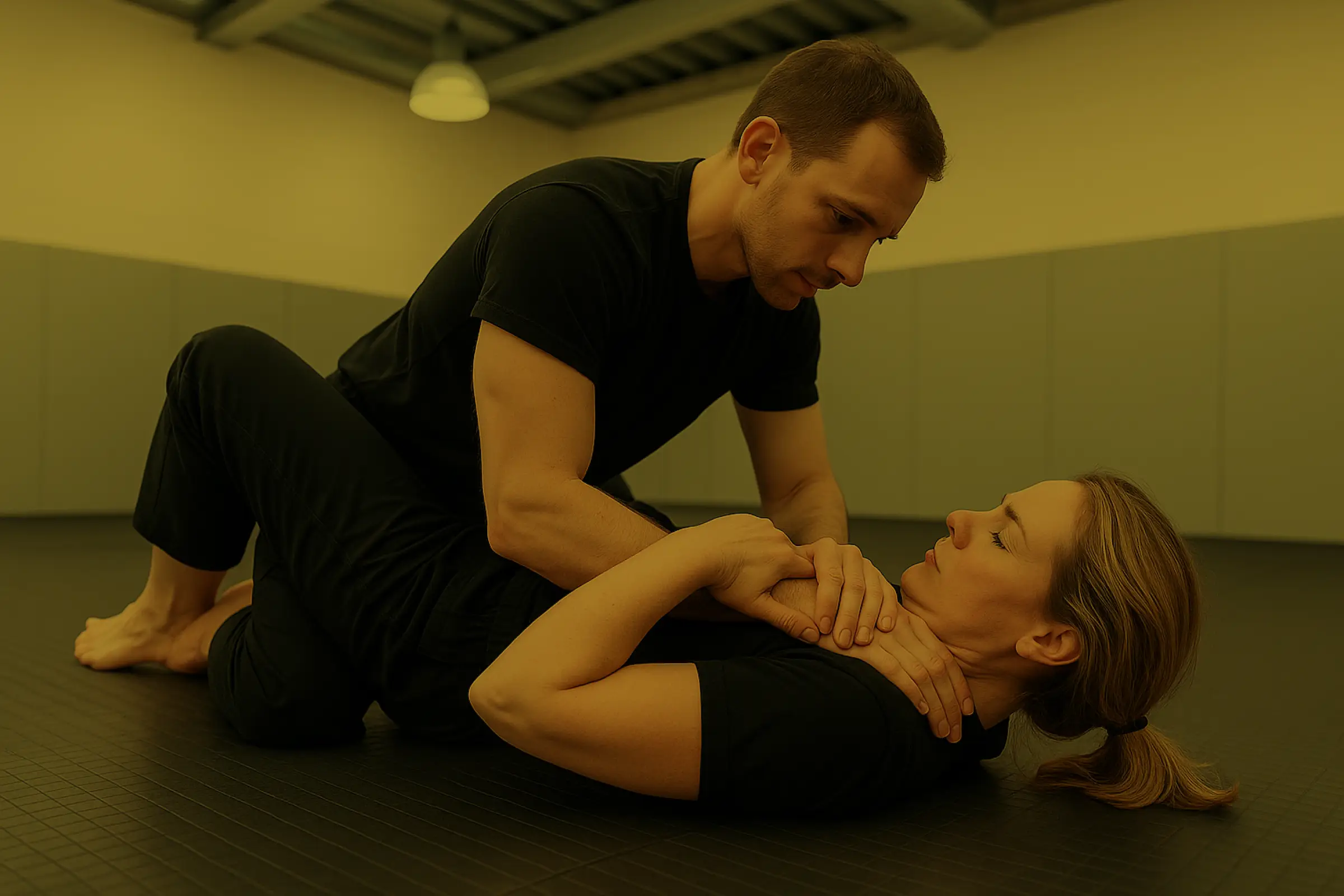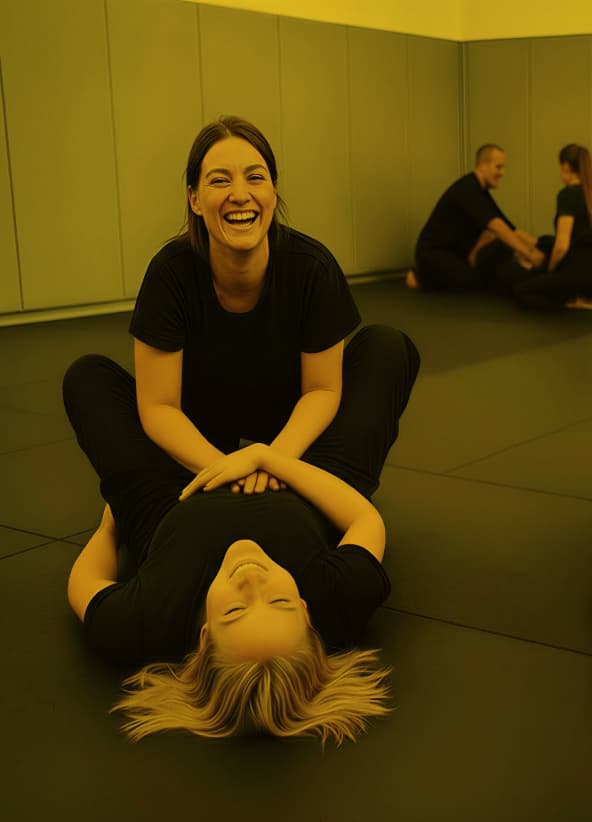
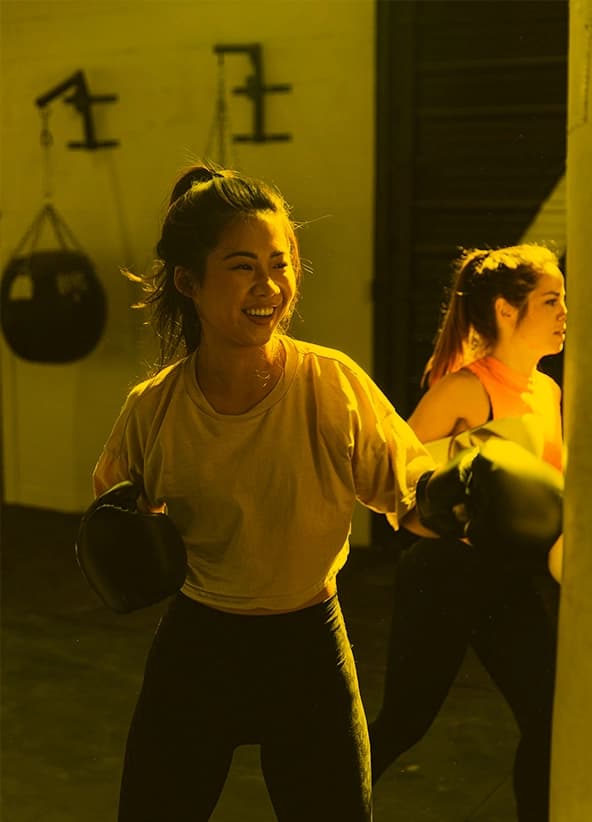
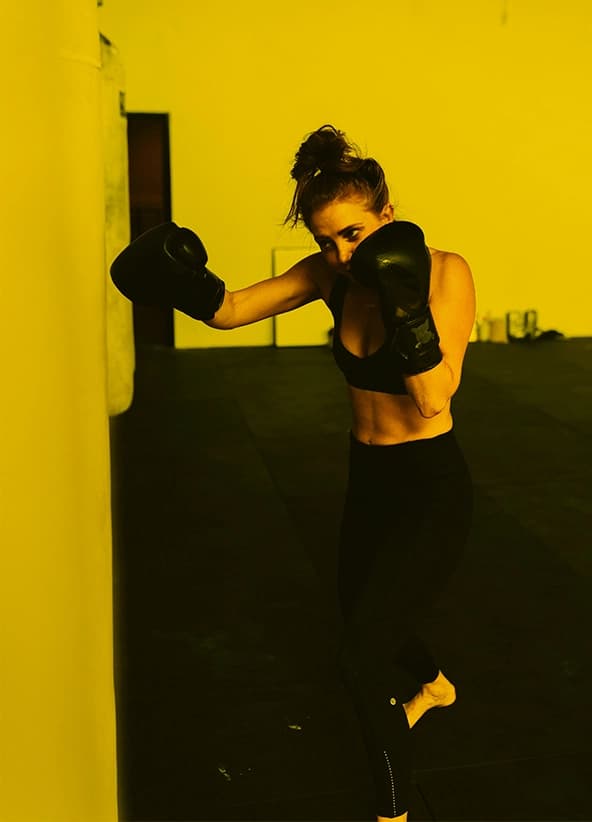
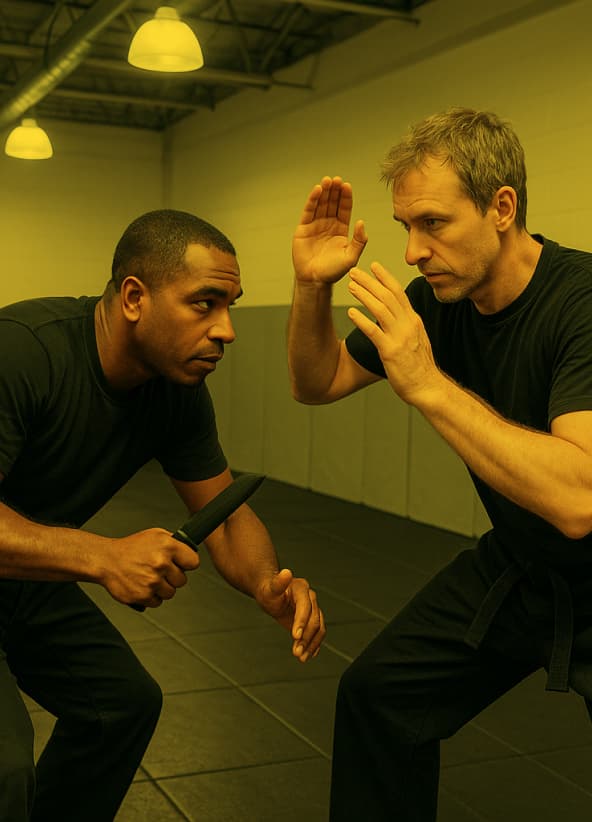
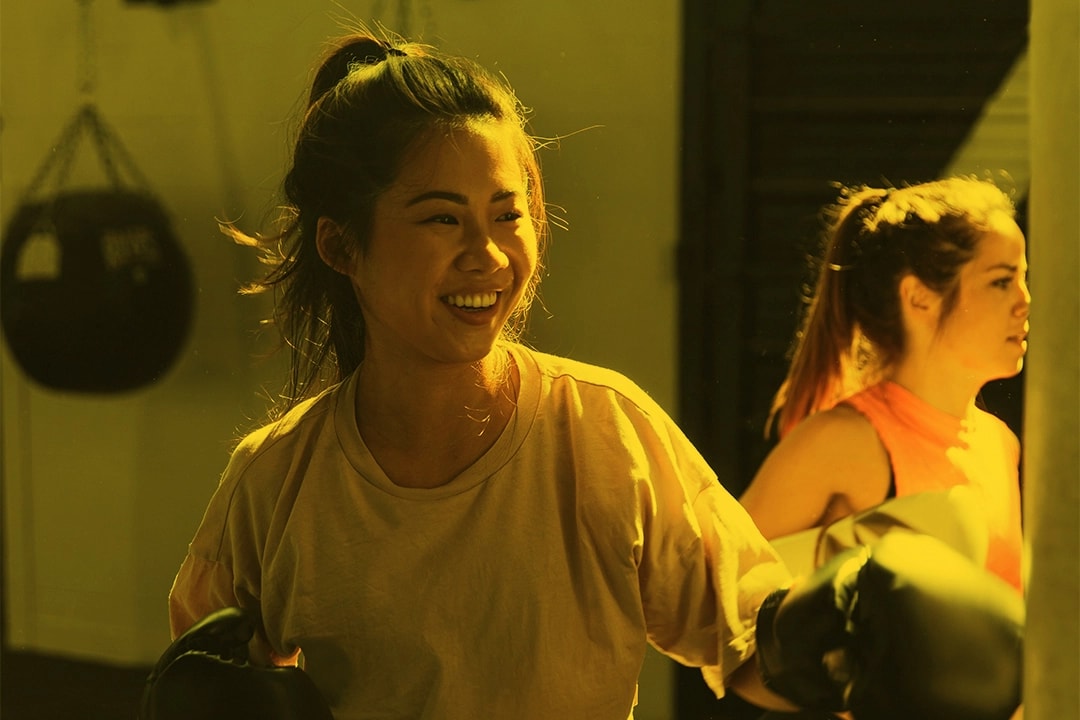
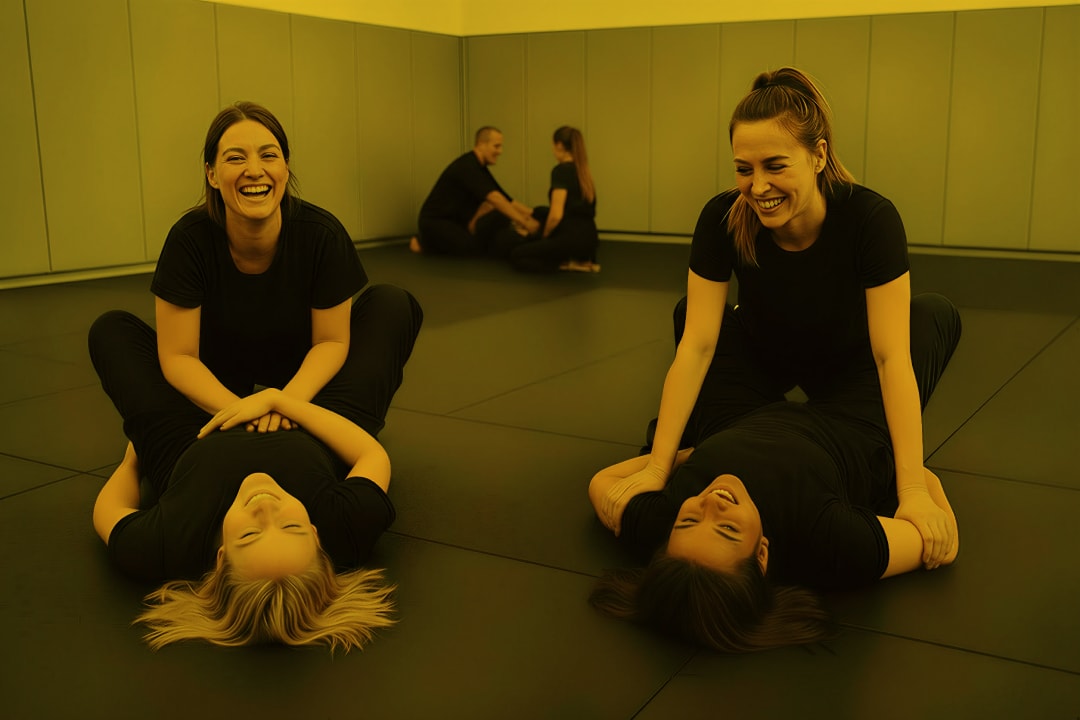
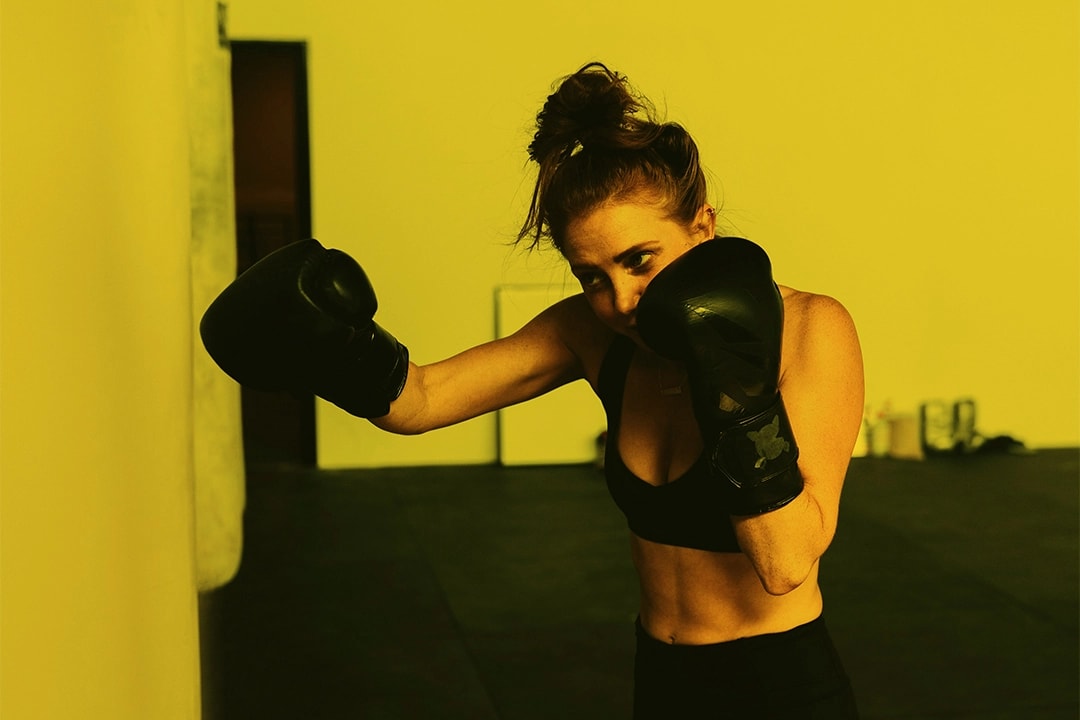
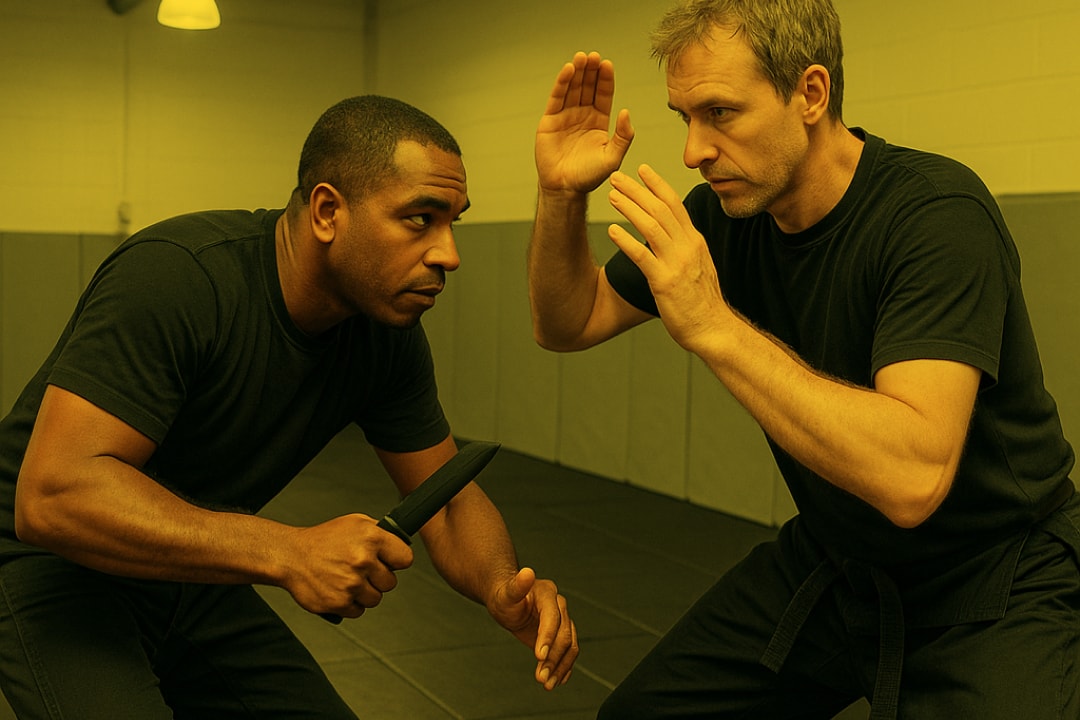
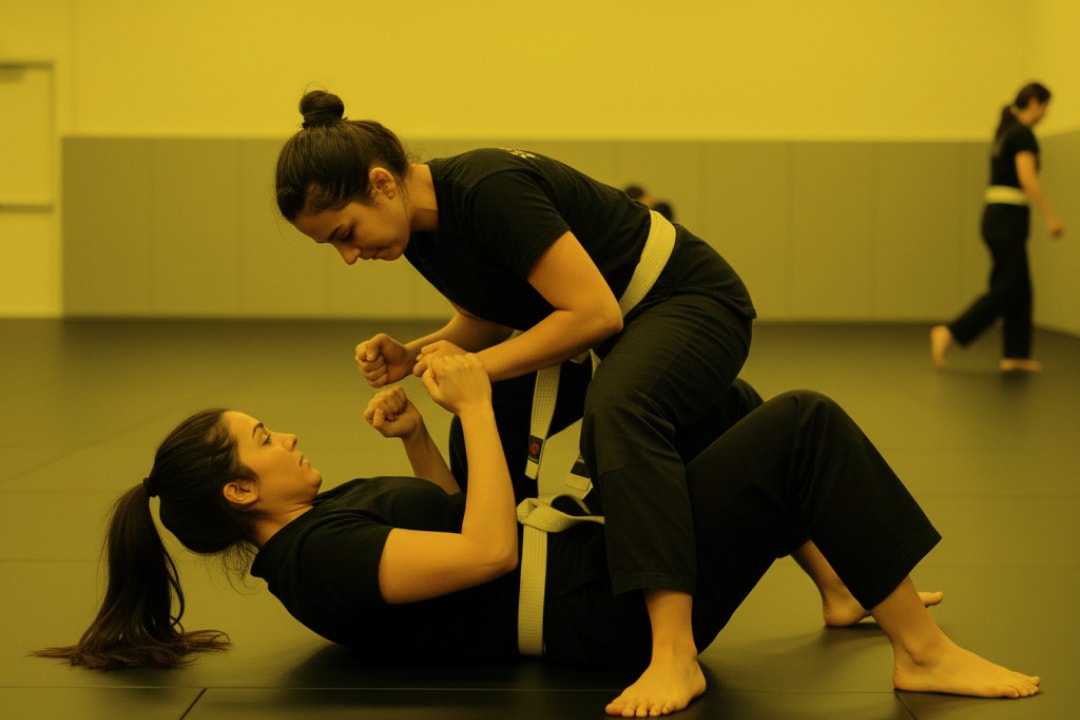
Why train at Shockwave Jujitsu?
You will gain life-saving self-defence skills in a safe environment. You will be welcomed and looked after as we guide you through our mixed martial arts syllabus. You will meet like-minded people. You will build your self-confidence. And, most importantly, you will have fun.
As you progress through your belts, these are the life-saving self-defence skills you will have gained by training with us:
Real-world preparedness
You will develop your situational awareness, allowing you to anticipate and respond to the types of dynamic threats you may face in the street.
Physiological awareness and mental fortitude
You will gain greater awareness of, and control over, your body; and learn how to calm your adrenaline-fuelled panic when in the face of physical danger.
Adaptability and proportionality
You will learn to calibrate the intensity of your response in proportion to the level of threat so that your actions remain within the limits of the law.
Syllabus
Mixed martial arts for real-world self-defence
Classes
Beginner-friendly mixed martial arts self-defence classes in Ipswich. See our mixed martial arts syllabus and book a free intro class today.
- Sundays
- 10:00–12:00
- Murrayside Community Centre (Studio 1)
- Thursdays
- 18:00–20:00
- Murrayside Community Centre (Studio 1)
Reviews
Our students come from all walks of life, some with previous experience of Martial Arts, some who are complete beginners.
“A great bunch of people”
“I started training at Shockwave Jujitsu as an alternative way to improve my fitness. Not only has my fitness level increased, my confidence has grown significantly. Whether you are a beginner or already at an advanced level, Shockwave Jujitsu will hone your skills and reward you with a sense of achievement, all whilst training in a relaxed environment with a great bunch of people.”
“Instructors are extremely knowledgeable”
“I really enjoy challenging myself at Shockwave Ju-Jitsu. I always look forward to getting down on a Sunday and training with like-minded people. The instructors are extremely knowledgeable and approachable.”
“Friendly place to learn”
“Excellent self defence training by 3rd Dan Black Belt Sensei Terry Tatum. Perfect for anyone looking for a friendly place to learn how to protect themselves on the streets using jujitsu.”
“All levels of ability are catered for”
“I have been training with Shockwave for the last four or five months now. Shockwave offers a unique approach to self defence whereby you are able to gain belt gradings in Jiu-Jitsu as you improve, and you are also able to develop relevant skills in striking and grappling week by week. The syllabus also includes how to defend against single, multiple, and armed assailants, and provides you with a great opportunity to build self-confidence. Everyone has been exceptionally welcoming, and all levels of ability are catered for.”
“Defend yourself and your loved ones”
“I joined a few months back and, being a foreigner, I didn't expect much, but I was pleasantly surprised by the level of training and support I received so far. Instructors are very knowledgeable and patient as they try to find an individual approach for every student. The overall atmosphere during the classes is very friendly and you feel like you achieved a lot after every session. This is an awesome way to keep fit and improve your confidence as well as an excellent opportunity to gain essential skills to defend yourself and your loved ones if needed.”
“Seriously impressed by their mixed martial arts syllabus”
“If you're looking to get back into martial arts and want to focus on developing practical self-defence skills rather than competing in tournaments, Shockwave Jujitsu is the ideal place to be. I found them through a Google search for martial arts clubs in Ipswich and was seriously impressed by the breadth of their mixed martial arts syllabus that offers a wide range of techniques to keep things fresh and exciting. Fast forward 8 years, and I'm still hooked and learning something new every week.”
“Being a female I feel very safe and comfortable training with the group”
“All instructors have a high level of knowledge and the classes are both informative and enjoyable. Being a female I feel very safe and comfortable training with the group. I have learnt so much and feel that my confidence has grown. I would highly recommend joining!”
Frequently asked questions
Contact us if you have any questions not answered below
What is the minimum age for training?
Because our classes are primarily attended by adults, the minimum age is 14.
We currently have 4 teenagers (14–18) who are long-term members and train regularly. The key is maturity: they need to be able to listen, stay focused, and train safely and respectfully — often while paired with an adult. Our instructors supervise the training closely, but the class is not structured like a kids’ programme with behaviour management and constant redirection.
It’s also never guaranteed there will be another student of the same age in the class, so a teenager should be comfortable training alongside adults. If you’re unsure whether this is the right fit, get in touch and we’ll advise.
Will I get beaten up?
No. We have a strict no-bullies, no-egos culture — nobody is here to show off or 'win' in training.
When we spar, we usually work at about 50% so we can focus on control, timing, and good technique rather than adrenaline and brute strength.
We’re very careful about safety so students can train consistently over time. That said, this is martial arts training and there is always some risk of injury.
Whilst we can’t guarantee you won’t get injured, we can promise you won't feel as though you've been roughed up.
Do I need any prior experience in Martial Arts?
No prior experience in martial arts is needed. Most people who join our classes have never done a martial art before.
As a beginner, you will be paired with an instructor who will guide you through your first classes. You won't ever be left alone wondering what to do or who to work with.
Do you offer female-only classes?
We run women-only self-defence courses, but our weekly classes are mixed.
For ongoing training, we think it’s important that women can practise skills with a variety of bodies — including men — because that’s closer to real-world conditions and it helps avoid false confidence.
If you’re not comfortable training with men, the women’s course is a great place to start: participants train only with other women, and instructors demonstrate and coach without needing to touch you.
Do you offer a free intro class?
Yes, we honour the martial arts tradition of offering a free intro class. We also offer regular beginners courses which are ideal for sampling our full syllabus.
As a beginner, you will be paired with an instructor who will guide you through your first classes. You won't ever be left alone wondering what to do or who to work with.
What should I wear? Do I need any equipment?
Loose/stretchy clothing e.g. comfy t-shirt, a pair of leggings, tracksuit bottoms, shorts over spats or martial arts (gi) trousers. Specialised footwear is not required – indoor trainers are fine though most people train in bare feet or in grippy socks.
In your first few classes you will be provided with light boxing gloves and leg pads to use for light standup sparring. Over time you will want to purchase your own MMA gloves, leg pads and perhaps a gum shield. Once you've become an established member, you might also want to purchase a Shockwave Jujitsu T-shirt.
What is Jujitsu?
Jujitsu "joo-jit-sue" (also known as Jujutsu, Ju-Jitsu and Jiu-Jitsu) is an ancient Japanese martial art which is often described as the mother of all Japanese martial arts as many other systems originated from Ju-Jitsu, e.g. the founder of Judo (Jigoro Kano) was a Jujitsu master who saw the potential for a sport in Jujitsu and came up with Kodokan Judo. Aikido also stemmed from an old Jujitsu school.
Although Jujitsu has older roots, it is most commonly associated with the methods of unarmed combat which the Samurai would use in feudal Japan when they were disarmed in battle. To someone with no experience of Jujitsu it is best described as an "all round" martial art as it has everything that a lot of other arts have and much more: punching, kicking, throws, locks and joint manipulation, chokes, grappling and ground-fighting are all practised in the art of Jujitsu.
Is Jujitsu effective in a real fight?
Whilst no self-defence system can guarantee 100% safety in every altercation, Jujitsu offers a wide range of practical tools that can be relied upon to tip the balance in your favour.
Many martial arts will teach a lot of complicated strikes and high kicks which would be impossible to actually use if one was attacked on the street. In Jujitsu, students develop instinctive responses against a wide variety of realistic attacks – rear attacks, holds, knives/weapons, punches, kicks, attacks on the ground and many more – but crucially, always with an eye towards preventative de-escalation or early escape should that fail.
Also, because size and strength is not a major factor in Jujitsu, its techniques often form the basis of self-defence courses offered to women.
Ultimately, beyond techniques, the effectiveness of Jujitsu depends upon your mental resilience and your commitment to regular training which will hone your ability to assess threats under pressure, react appropriately, and significantly reduce the chances of you being caught off guard.
Do you teach MMA (Mixed Martial Arts)?
We teach mixed martial arts for self-defence rather than for competition. Our instructors have backgrounds in Karate, Judo, Brazilian Jiu-Jitsu, Kickboxing and other fighting styles. Accordingly, our self-defence syllabus combines these styles into a cohesive whole so that you learn from a variety of arts and not just one narrow selection of techniques that might lose their edge in any given scenario.
Students first learn the principles and concepts informing the syllabus and can then explore what techniques work best for them based on successes and failures discovered whilst testing themselves against different training partners. The goal is develop students who can problem-solve in real-time and who can rapidly adapt to different assailants and changing circumstances.
Do I need to be aggressive?
You need to know how to apply your aggression judiciously. Our perspective is the avoidance of a physical confrontation is preferred but if that is impossible or unsafe, you need to value your life highly enough that you would immediately retaliate to preserve it. Hesitation can be fatal and so the goal of regular training is to develop instinctive responses in direct proportion to the level of threat.
Because normal brain function is significantly impaired when under stress, every class includes sparring (stand-up striking and/or ground-fighting) where your skills can be pressure-tested against a resisting opponent. This is vital practice in retaining your composure whilst on the receiving end of aggression at the same time as learning how to temper your own aggression in the heat of the moment.
What is the difference between Martial Arts and Self-Defence?
Martial arts is a broad term for a variety of traditions and applications. In terms of training as a civilian, a clear distinction can be made between combat sports and self-defence.
Self-defence training is about avoiding fights and responding with force only when conflict cannot be avoided. Combat sports are about initiating a fight with a willing opponent.
Whereas self-defence is about de-escalation and the minimum application of force, combat sports are about escalation towards maximal application of force until victory is achieved.
A more sobering way of looking at it is: in combat sports two competitors share the same skillset, body weight, and a referee who enforces rules to ensure a fair fight. In self-defence situations there is no referee, there are no rules, no weight parity, no prohibition on the use of weapons and no limit on the number of assailants you may be up against.
Do you grade students?
Yes. Students are graded regularly and, if successful, are awarded with a belt and certificate to honour their progress.
If I have a medical condition, can I still train?
As long as the instructors are made fully aware of your condition, and both you and the instructors know how much (if at all) it limits your training, then you will be fine. Any medication needed, e.g. inhalers, insulin, etc., should be brought to each training session. In some special cases, a doctors note may be required to show you are fit to train.
Do I need to be fit to train?
A high level of fitness is not important in Jujitsu training. People do join the class as a way of improving their cardiovascular fitness and learning something useful in the process.
